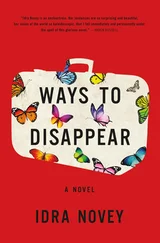“I told you about the twelve appointments you can get with a psychologist, if someone in your family—”
“So you think I should go to a shrink because I don’t want to stay home with you tonight?”
“No. But because you’re so clearly full of sorrow and anger. Because you run away from me. And because something goes wrong every time I try to talk to you about it.”
“I just wanted to go to the meeting.”
“When I say psychologist , maybe it makes you think about your grandmother, because of the training she’s doing. And so you think that it wouldn’t be anything for you. I’d feel the same way. But a real psychologist is something completely different.”
“I’m not thinking about Grandma.”
“Did I ever tell you that when my father left us, I was angrier with my mother than with him?”
“Yes, you’ve told me a thousand times!” He gets up from the table. “Dad isn’t well! And there isn’t any psychiatric report that says he isn’t going to jail! There’s nothing at all to celebrate, and there’s nothing nice about being here! I’m going now!”
“Won’t you please just stay for five minutes?”
“But five minutes always becomes an hour, and then the whole evening.”
“You’re not really going to go before we’ve become friends again?”
“Stop saying that I’m angry at you!”
“But you are shouting.”
“I’m shouting because you say that I’m angry.”
“Let’s just talk until we’re good friends again. Just five minutes.”
“Mom, you’re lying to me! It won’t be five minutes. It’s never five minutes.”
“Five minutes!”
“You’re lying.”
“Five minutes, Niklas! This time I swear.”
“Mom, it won’t be five minutes. Because things’ll never be fine in five minutes. They won’t be fine even if we sit here and talk all night long.”
He runs up to his room and slams the door.
I hear Frederik storm out into the hall, shouting that he can’t concentrate with the noise. Niklas yells back that just a couple of minutes ago he was banging his fucking fiberboard on the floor. I don’t have the energy to go up and sort it all out. I turn on the TV and boxing comes up on Eurosport. Frederik must have been watching it today. I surf around until I find a program with some beautiful happy American women.
A few minutes later, Niklas comes down. He’s changed clothes and mussed up his hair; he obviously wants to leave now.
“Sorry about yelling at you,” he says.
“I’m sorry I yelled at you too.”
I’m allowed to give him a silent hug.
“Are you okay?” he asks.
I recognize the look he gives me. It isn’t love, but a bitter worry I might do something dumb. He’s probing, to see if he can go and join his friends. He casts a brief sidelong glance at the wineglass on the coffee table.
I lie. “I’m fine.”
I’m sure he sees that it’s not true, but he also must see that I’m not on the edge of a breakdown.
“I’ll be at Kira’s,” he says. “I’ll be back before eleven.”
From the kitchen window I watch him ride off.
And so you ride away from us; from Frederik and me. It feels so decisive, like it marks the end of an epoch, this very minute. How I envy your ability to find out how not to stay those five minutes that always turn into more. That’s what I never figured out — or dared to do — with my own mother. I envy your ability to bike away from me.
The beautiful women on TV get to be too much in the end, so I click back to boxing. The Mexican’s penalized for ramming his forehead into the Romanian. Sweat, the clang of the bell, towels and bloody lips. I ought to go up to Frederik, try to talk with him about Niklas. But I can’t summon the energy that would require. So many things we ought to do; we ought to be able to trust each other. We ought to be able to support each other. And he ought to be completely different, so that I might feel the smallest fraction of desire for him.
Instead I prop my feet up on the coffee table. Boxing’s never caught my interest, but Frederik’s been forcing me to watch it these last few days, and I’ve started to develop a taste for it. They pound away at each other — I can see the pleasure in that. And then there is their technique and speed, their fantastic physiques.
I’m enjoying the fight and the men’s grunting, gently relieving a bit of stress, when the phone rings. I quickly turn off the TV and yank my hand from my pants.
I hear Bernard’s voice. “Am I disturbing you?”
“Uh-uh. No.”
“I just wanted to say congratulations.”
“Well thank you.”
“Such a great day.”
“That’s just the way I feel.”
In no time, I’m transported to the festive evening I’d been dreaming of. We congratulate each other again warmly, and Bernard tells me that he also has something major to celebrate. The doctor from Lærke’s day-care center confirmed what he saw the other day on the lawn: Lærke’s still improving, the coordination in her right leg is better, and her willpower’s getting stronger.
“In fact, I’m sitting here pouring myself a glass of wine,” he says. “Lærke’s gone to bed. Do you have a glass so we can toast?”
“I do. Good idea.”
Frederik isn’t allowed to drink, so I settled for buying myself a half bottle for our celebratory dinner. I raise the glass before me.
“Cheers.”
“Cheers.”
We talk about how much better both Frederik and Lærke might get. I’m half reclining in the armchair with my feet up on the coffee table, and as I listen to Bernard, I turn the boxers back on, this time on mute. I ask him whether he knows anything about neurophilosophy — Dr. Lebech’s word — mostly so I can listen to him some more without having to talk myself. The better sculpted of the two boxers, the Mexican, sits down in his corner, sweat sheening his torso. His abdominal muscles bulge beneath his skin, nicely defined, and he gasps for air. I slide down in my chair even farther, work my hand back into my pants, and start relaxing again to the sight of the boxers — and especially now to Bernard’s deep voice.
After his neurophilosophical review, he says, “This has been very hard on you, but you haven’t been thinking about leaving your husband. I find that admirable. It’s one of the first things I noticed about you. Your loyalty is really remarkable.”
“And the same with you, Bernard — I feel it’s amazing how you always support your wife and take her part. It’s unusual for a man.”
“I just feel that once you’ve chosen each other—”
“My feeling exactly.”
I take a swallow from my glass and can hear that he does the same. It seems like we’ve said everything there is to say on the subject, but he continues. “That’s something you and I have in common. Lots of other people wouldn’t have been as faithful as we’ve been.”
I start to laugh.
“What’s so funny?”
“I don’t know.”
Neurophilosophy is a rapidly advancing branch of philosophy that uses neurological research to shine a new light on classical philosophical problems.
The 1986 publication of Patricia Churchland’s modern classic, Neurophilosophy , was the first major breakthrough in the field. Since then, a number of prominent philosophers and neurologists have contributed to new knowledge of the subject. Among them, Daniel Dennett, Antonio Damasio ( Descartes’ Error ), Daniel Wegner, and Benjamin Libet have had the most impact.
They all base their research on the scanning technology developed in recent decades, which gives us the ability to peer into the brain while it works. The ongoing revolution in neurological monitoring equipment enables us to observe and measure fear, love, substance dependence, empathy, egotism, decision-making, daydreaming, and numerous other mental phenomena as they manifest themselves in the human brain.
Читать дальше



![Ally Carter - [Gallagher Girls 01] I'd Tell You I Love You But Then I'd Have to Kill You](/books/262179/ally-carter-gallagher-girls-01-i-d-tell-you-i-lo-thumb.webp)








